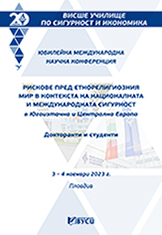Етнорелигиозният мир в Югоизточна Европа – предпоставка за обезпечаване на енергийната сигурност и за повишаване на енергийната свързаност на региона
Ethno-religious peace in Southeast Europe – a prerequisite for ensuring energy security and increasing energy connectivity in the region
Author(s): Ivelina Dimitrova Dimitrova
Subject(s): Economic policy, Environmental and Energy policy, Security and defense, Inter-Ethnic Relations, EU-Approach / EU-Accession / EU-Development, Geopolitics, Peace and Conflict Studies, Asylum, Refugees, Migration as Policy-fields
Published by: Висше училище по сигурност и икономика (ВУСИ)
Keywords: ethnic stability; religious peace; energy security; energy connectivity; energy integration
Summary/Abstract: The region of South Eastern Europe has long history dating back in the past of numerous armed conflicts provoked by ethnic and religious intolerance. The unstable ethno-religious situation was the legacy left after the dissolution of the Ottoman Empire – a long process which started in the 19th century and officially ended in 1922. Another crucial moment that brought much instability to the region and especially to the Western Balkans was the breakup of Yugoslavia in 1992 and the Yugoslav wars that came as an aftermath. Today the region is a more peaceful place due to the fact that all the countries initiated their European integration. Important factors for the stabilization of the situation are also the improvement of the economic stability and the energy integration between the countries from the region. The economic and energy interdependence is the most solid guarantee that the conflicts from the past will not repeat themselves.
- Page Range: 65-71
- Page Count: 7
- Publication Year: 2024
- Language: English, Bulgarian
- Content File-PDF

